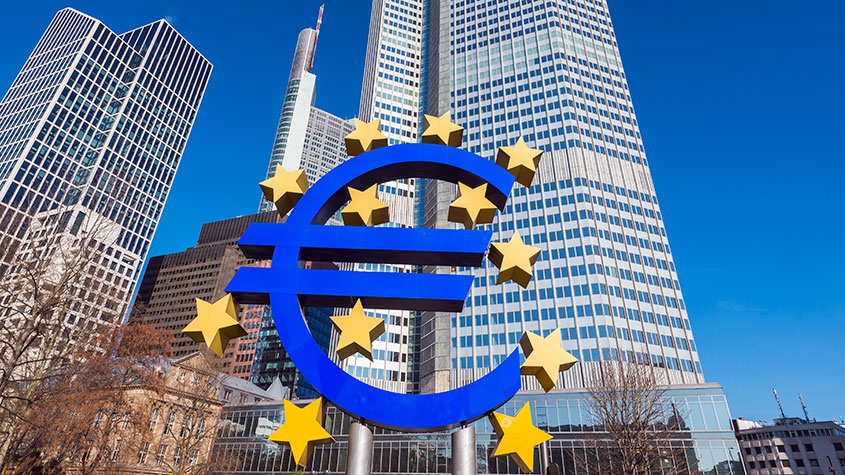Britain must prepare for the collapse of the euro
If the eurozone implodes and the euro collapses, Britain needs to be ready, says Matthew Lynn. Here's what we should do.

Get the latest financial news, insights and expert analysis from our award-winning MoneyWeek team, to help you understand what really matters when it comes to your finances.
You are now subscribed
Your newsletter sign-up was successful
Want to add more newsletters?
The Treasury, according to reports this week, has started studying the likely impact of the euro's demise on the UK economy. No surprise there just about anyone can see the single currency is going through a crisis that may prove terminal.
It's only sensible for the government to start planning for the moment when it comes crashing down. But what should the plan be? What are the likely consequences for the City and the British economy? Is there anything we can do now to get ready? The answer to that last question is: plenty.
No one can say for certain yet whether the euro is going to pull through this crisis. Maybe the EU's leaders can find a way of bailing out Greece, getting its economy growing again, calming fears about Spain and Italy, and creating a fiscal union that distributes money around the continent in a way everyone feels is fair and equitable. It's not impossible. But you wouldn't want to bet very much on it. This crisis is about to start dragging into its third year and it gets worse with each passing month. If there was a plan to fix the euro that everyone could agree on, I suspect we would have heard something about it by now. So the odds are rising all the time that the euro won't be around in three or five years from now at least not in the form we know it today. Quite possibly it won't even make it through to Christmas.
Try 6 free issues of MoneyWeek today
Get unparalleled financial insight, analysis and expert opinion you can profit from.

Sign up to Money Morning
Don't miss the latest investment and personal finances news, market analysis, plus money-saving tips with our free twice-daily newsletter
Don't miss the latest investment and personal finances news, market analysis, plus money-saving tips with our free twice-daily newsletter
That may well be catastrophic for Britain. The leaked details of the Treasury plan certainly seemed to indicate as much. It warns of the huge risks a collapse would pose to an already fragile economy. No doubt that is correct. If the euro implodes, our biggest trading partner will go into a deep recession. Banks may well go under, so will currencies both new and old. Investment will freeze up. Unemployment will soar. There is no way Britain is going to escape from that unscathed.
Whether the euro survives will not have much to do with us. No one particularly cares what the British think. If the thing is unworkable, we can hardly fix it now. Still, as any bridge player will tell you, there is no point in complaining about the cards you are dealt. You can either play them well or badly. I think there are four steps Britain could take to position itself for a post-euro Europe.
First, strengthen the banking system. In a post-euro world, the City should be much stronger. It will be the only major financial centre in Europe apart from Zurich not caught up in the mess. That will put it in a powerful position. But first it has to emerge unscathed from the inevitable crash.
The Bank of England needs to make sure British banks, asset managers, hedge funds and brokers have cut their exposure to a euro collapse to as close to zero as possible. That means they shouldn't be holding peripheral nation debt. They shouldn't be holding French and German debt either: both markets will collapse. They shouldn't be selling insurance against sovereign defaults, and they shouldn't be taking speculative positions in it either. The only way to survive in the event of a collapse is to be out of the game. The banks may not like it, but that's tough. They have been bailed out once already. The last thing Britain needs is another banking crisis.
Second, capture the currency markets. We don't know what the post-euro monetary system will look like. It might be a north/south euro. It could be a core euro (Germany, the Netherlands, France and Austria) with peripheral currencies around it. It could be a full-scale return to all the national currencies. One thing is for sure, however currency trading within Europe is going to be big business again. London is its natural home. The City should be getting ready now to host that business.
Third, renegotiate the treaties. Britain has always been a minor player in EU politics. It joined too late and too reluctantly to have much say in the architecture of the union. From agricultural policy to employment law to industrial policy, much of what the EU does is not particularly in Britain's interests. But post-euro, everything will be up for grabs. The EU will change course dramatically. Federalism will have been dealt such a massive blow if the euro doesn't work that it will take it a generation or more to recover. Britain along with the other non-euro states can seize the chance to create a more open, free market, small government EU.
Fourth, prepare industry for a fire-sale. If the euro does collapse, there will be turmoil across the continent. Values of assets will fall dramatically, regardless of whether the underlying business is any good or not. In contrast, sterling will strengthen as a relative safe haven. Britain has lots of big companies that are cash-rich right now and their sterling will rise in value against whatever currencies emerge in the rest of Europe. Encourage them to take a one-off opportunity to expand across the continent.
Clearly, a euro collapse will be huge blow for Britain's economy. Any hopes of a swift recovery will be blown away. But there will be opportunities there as well and Britain may as well get ready to take them.
This article was originally published in MoneyWeek magazine issue number 558 on 7 October 2011, and was available exclusively to magazine subscribers. To read all our subscriber-only articles right away, subscribe to MoneyWeek magazine.
Get the latest financial news, insights and expert analysis from our award-winning MoneyWeek team, to help you understand what really matters when it comes to your finances.

Matthew Lynn is a columnist for Bloomberg and writes weekly commentary syndicated in papers such as the Daily Telegraph, Die Welt, the Sydney Morning Herald, the South China Morning Post and the Miami Herald. He is also an associate editor of Spectator Business, and a regular contributor to The Spectator. Before that, he worked for the business section of the Sunday Times for ten years.
-
 What do rising oil prices mean for you?
What do rising oil prices mean for you?As conflict in the Middle East sparks an increase in the price of oil, will you see petrol and energy bills go up?
-
 Rachel Reeves's Spring Statement – live analysis and commentary
Rachel Reeves's Spring Statement – live analysis and commentaryChancellor Rachel Reeves will deliver her Spring Statement on 3 March. What can we expect in the speech?
-
 No peace dividend in Trump's Ukraine plan
No peace dividend in Trump's Ukraine planOpinion An end to fighting in Ukraine will hurt defence shares in the short term, but the boom is likely to continue given US isolationism, says Matthew Lynn
-
 Europe’s new single stock market is no panacea
Europe’s new single stock market is no panaceaOpinion It is hard to see how a single European stock exchange will fix anything. Friedrich Merz is trying his hand at a failed strategy, says Matthew Lynn
-
 Britain’s inflation problem
Britain’s inflation problemInflation in the UK appears to be remaining higher for longer when compared with similar rich countries. Why? And when can we expect a return to normal? Simon Wilson reports.
-
 Eurozone inflation hits 10.7% in October
Eurozone inflation hits 10.7% in OctoberNews Inflation across the eurozone hit 10.7% in October. What does it mean for your money?
-
 A forgotten lesson on the dangers of energy price caps
A forgotten lesson on the dangers of energy price capsAnalysis Liz Truss’s proposed energy price cap is an ambitious gamble. But a similar programme in Spain ended up being a fiasco, say Max King and Tom Murley. Here, they explain why Truss’s plan could be doomed to failure.
-
 Don't be scared by economic forecasting
Don't be scared by economic forecastingEditor's letter The Bank of England warned last week the UK will tip into recession this year. But predictions about stockmarkets, earnings or macroeconomic trends can be safely ignored, says Andrew Van Sickle.
-
 The wolf returns to the eurozone’s door
The wolf returns to the eurozone’s doorEditor's letter The eurozone’s intrinsic flaws have been exposed again as investors’ fears about Italy’s ability to pay its debt sends bond yields soaring.
-
 Eurozone economy heads for paralysis
Eurozone economy heads for paralysisNews Record high energy prices, the threat of recession in Germany and squabbling in Italy's government has left the eurozone fighting fires on all fronts.